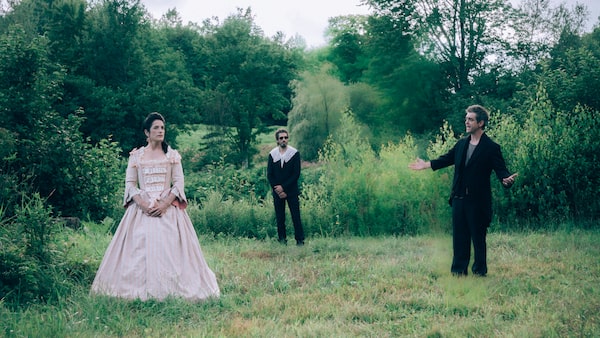
Canadian Indigenous filmmaker Danis Goulet's feature debut Night Raiders will screen at the Berlin International Film Festival.Fred Lum/The Globe and Mail
For Canadian filmmaker Danis Goulet, time is a flat circle. Set in the year 2043, the director’s feature debut Night Raiders presents a harsh, grey-colored North American dystopia in which the movement of citizens is tightly controlled, cultural history is purposefully extinguished and children are the property of the state. With the assistance of drones that patrol the sky like shiny vultures, military forces hunt down rogue families, tossing any wayward boys and girls into a sinister institution called The Academy.
While that cold, cruel world sounds like a perfectly nightmarish future, it is also a direct, blistering echo of the past. Because for the Cree/Métis filmmaker Goulet, there is no escaping our shared history – even if most Canadians would prefer to never look back.
“Everything in the film, even though it’s set in the near future, has already happened in some way – everything is based on real events or colonial policies that were inflicted on Indigenous people,” said Goulet during a Zoom interview the other week. “Obviously the idea that children are the property of the state is an allegory for residential schools. But the film’s idea of moving people onto bad tracts of land is based on the reserve system, and the idea of keeping them from moving around is based on the pass system that Indigenous people were required to obey to leave their reserve, which I still don’t think many Canadians know about.”
Following a resourceful Cree mother (rising star Elle-Máijá Tailfeathers) as she attempts to rescue her daughter (Brooklyn Letexier-Hart) with the help of an underground band of freedom-fighters, Night Raiders is one of the buzziest films premiering at this week’s virtual Berlinale film festival. A Canada-New Zealand co-production bearing the executive-producing imprint of Taika Waititi (Jojo Rabbit), the film represents breakthrough moments for both Goulet, who has been busy making short films when she wasn’t programming for the Toronto International Film Festival and imagineNATIVE, and the burgeoning subgenre of Indigenous sci-fi/horror.
Along with Jeff Barnaby’s sick-and-slick zombie thriller Blood Quantum from last year, Nyla Innuksuk’s forthcoming alien-invasion flick Slash/Back and the CBC’s supernatural series Trickster (more on that in a moment), Night Raiders uses the familiar elements of genre filmmaking – thrills, action, a heightened sense of style – to act as a Trojan Horse for themes that audiences might otherwise ignore.
“There can exist a fatigue out there: ‘Oh, here’s another issue we have to get into.’ Go on Twitter any given day of the week. But genre filmmaking is a way to go at it where it doesn’t hopefully feel like a chore to take in,” said Goulet. “You can instead come along for a ride on this propulsive story.”
Not that Goulet ever thought that she would be a sci-fi filmmaker. Her sensibilities were originally more steeped in, say, the social realism practised by Andrea Arnold (Fish Tank, American Honey), with her earlier work focusing on families much like her own. It was only about decade into her short-film career, after securing a commission from BravoFact for a film commemorating the 100th anniversary of Toronto’s Elgin and Winter Garden Theatre Centre, that Goulet took a tentative step into the future. So to speak.
“At the time, I’d been thinking about oral storytelling traditions and characters I heard about growing up around the fire, and I challenged myself to place them in a kind of fantasy movie,” Goulet said.
The result was 2013′s Wakening, which follows Wesakechak, a solo Cree wanderer, hunting for the cannibalistic Weetigo monster in a postapocalyptic Toronto. The journey leads to the dilapidated downtown Elgin theatre, where the forgotten artifacts of our history and the chilling possibilities of what’s to come collide in exhilarating fashion.
“It felt like an experiment at the time. I would’ve stood amongst my film friends in the art-house circles and sheepishly said, ‘Um, hi, I’m making a monster movie.’ But I found the process liberating, and it opened up avenues and processes to talk about things that I wanted to say in completely different ways,” Goulet recalled. “It feels like a natural extension of Indigenous storytelling, too, and the way in which there are mystical things that are treated as just part of our world.”
In Night Raiders, a desperate Cree woman named Niska (Elle-Máijá Tailfeathers) joins an underground band of vigilantes to get her daughter back.Courtesy of Elevation Pictures
For Night Raiders, that world includes a prophecy about a Cree woman who will guide the world to freedom but also a mid-film turn involving a pandemic. While the appearance of a virus can be viewed as accidentally prescient – Night Raiders was shot in the fall of 2019, months before anyone had ever heard of the word “COVID” – it is more a further instance of Goulet creating a future by pulling from the past.
“I based that on smallpox because that decimated many Indigenous communities, including my dad’s home community in Saskatchewan at some point in history,” she said. “When the coronavirus did happen, in post-production, it completely changed the viewing experience in those scenes.”
Night Raiders was produced with the support of Canada’s Indigenous Screen Office, which last month launched the Indigenous Identity Consultation Process. The program aims to better define the “extremely sensitive and divisive” matter of Indigenous identity when it comes to funding Indigenous film and television productions – and arrives following the controversy surrounding Trickster director Michelle Latimer.

Goulet resigned from the CBC series Trickster after director Michelle Latimer's claimed Indigenous ancestry was called into question.Fred Lum/The Globe and Mail
Goulet resigned from her role as a consulting producer on the now-cancelled CBC series this past December, a day after Latimer’s Indigenous identity was called into question. (“My involvement in Trickster was with the understanding that I was working on a show that was co-led by Indigenous creatives,” Goulet tweeted at the time. “However, now that there is uncertainty about this, I feel a responsibility to uphold the values that I am dedicated to. Therefore, I resigned from Trickster last week. I continue to be in touch with many from our screen community about the best way forward.”)
When it comes to the ISO’s new initiative, Goulet thinks that it is a “really important process given where we’re at as an Indigenous film community.”
“For years, Indigenous filmmakers have been advocating to have voice and greater representation, especially in feature-film format and to have access to larger budgets,” she added. “The creation of the ISO came upon decades of advocacy, and I’m grateful for their hard work of continuing to dig into and grapple with the most pressing questions facing our community.”
As always, then, Danis Goulet has her eyes on the future, all while informed by the past.
Night Raiders premiered March 2 at the Berlinale film festival; it will be released in Canada later this year
Canadians Take Berlin
This year’s Berlinale might be a virtual affair, but that doesn’t lessen the impact that Canadians are having at the annual celebration of global cinema. Along with Danis Goulet’s Night Raiders, here are the Berlin-certified Canadian premieres to watch out for later this year.

Courtesy of Timelapse Pictures
Tabija (The White Fortress): The latest feature from the Toronto-based director Igor Drljaca is a patient, poetic romance that pivots on the societal divides of a postwar Sarajevo. Featuring lovely lead performances from Pavle Cemerikic and Sumeja Dardagan as young lovers from two wildly different backgrounds, The White Fortress should likely surface later this year at TIFF or other Canadian fests.

Courtesy of Rhayne Vermette
Ste. Anne: Winnipeg artist Rhayne Vermette’s abstract look at family, memory and regret, all filtered through the reality of daily life in the Métis Nation, makes a big impression. More experiment than straight-ahead narrative, Vermette finds many tiny slivers of beauty by shooting on 16mm.

Inspiratrice & Commandant
Hygiène sociale (Social Hygiene): Quebec’s prolific Denis Côté is back with this shot-during-lockdown exercise. Making playful use of today’s keep-your-distance reality, the avant-garde film examines the shifting relationships between one bon vivant (Maxim Gaudette) and the many women in his life – each character delivering their mini-monologues six feet apart from one another.
Plan your screen time with the weekly What to Watch newsletter. Sign up today
 Barry Hertz
Barry Hertz